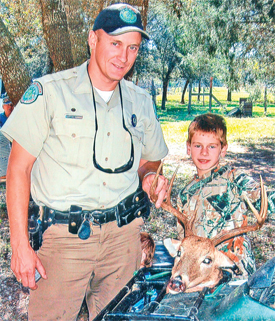From the time he was a teenager guiding goose hunters on the Texas coastal prairies, probably even before then, Justin Hurst was subconsciously preparing himself to make a difference in natural resource conservation. Those who knew him say he seemed to approach life with that goal in mind. Although his journey was cut short when he lost his life in the line of duty on his 34th birthday, March 17, 2007, Hurst had already made his mark on the Texas landscape. And, the impacts he had on the state’s wildlife resources, as well as on his family, friends, coworkers, and even adversaries, serve as his legacy.
“Game Warden Justin Hurst personified all of what Texas Parks and Wildlife represents,” Col. Peter Flores, TPWD Law Enforcement Division Director, says. “He cared for wildlife, he was a pillar of his community, and he cared deeply for his family and was a faithful public servant. His death is a great loss to the people of Texas.”
Hurst started his career with the Texas Parks and Wildlife Department as a biologist in August 1995 specializing in waterfowl management along the mid-coast. Fellow wildlife biologist Matt Nelson remembers joining TPWD at the same time as Hurst.
“He went to Peach Point (Wildlife Management Area) and I went to Mad Island (WMA), both of us worked on the central coast wetlands project,” Nelson recalls. “We had numerous research projects going on at the same time and spent most weeks together; fish sampling, working up alligators and mottled ducks. A lot of late nights together running around the marsh in air boats. Justin was very enthusiastic, dedicated towards the resource and approached everything full-bore.”
At Peach Point WMA, Hurst was able to submerse himself in his passion for waterfowl and the marsh habitat. For six years, he built a reputation as a wildlife biologist who understood the resource and conservation.
“He got it,” offers Dave Morrison, TPWD waterfowl program leader. “He understood the importance of resource management and conservation and could relate that to others. He was a heckuva biologist.”
That’s why it came as such a surprise when he announced plans to become a game warden.
“No one within the project saw that coming,” says Nelson. “He never mentioned anything to us, and then out of the blue he said he planned on going to the game warden academy. He’ll always be a biologist to us. The thing about Justin, whatever he put his mind to, he’d do it well. We lost a good biologist.”
Hurst became a part of the 48th Texas Game Warden Academy and graduated in August of 2002. While at the academy, Hurst shared his knowledge about waterfowl with fellow cadets and actually taught duck identification techniques. Some of his classmates referred to Hurst as the “Super Cadet” because of his diligence and drive.
After graduation, Hurst served about a year in Brazos County when a game warden slot became open in Wharton County. Hurst met with then TPWD Law Enforcement Division Director Col. James Stinebaugh personally to make his case for a transfer.
Stinebaugh says the decision to transfer Hurst was a no-brainer, but admits it did cause a rumbling in the ranks at the time.
“Typically, we required at least two years experience before letting a warden put in for a transfer, but it just made perfect sense to put Justin back down there because we needed someone who knew waterfowl in that position,” Stinebaugh says. “I took some heat for that move, but it was the right move.”
Hurst’s supervisor, Capt. Rex Mayes, says he knew well ahead of time he would eventually see Justin Hurst working in his district some day and is glad the colonel broke from tradition. “I remember meeting him for the first time when he was still in the academy,” Mayes recalls. “He said he wanted to come to my district because we had the bay that he loved so much. I remember when he left my office that first time; it was a rude awakening for me because I was seeing for the first time a new breed of game wardens, the whiz kids.”
Game wardens who worked in the field with Hurst remember him most for his preparedness, dedication and respect for others; even those individuals he issued citations to for game law violations.
Hurst is survived by his wife, Amanda, and son, Kyle Hunter, age 4 months, his parents, Allen and Pat Hurst of Bryan, a brother, Greg Hurst of Denver, Colorado, and in-laws, Larry and Jeanie Wilcox of Denton, Texas.
Memorial fund donations may be made to Operation Game Thief, c/o Justin Hurst Memorial Fund, 4200 Smith School Road, Austin, TX, 78744. The Houston 100 Club is also accepting donations for the family at: 100 Club Survivor’s Fund 1233 West Loop South, Suite 1250, Houston, TX 77027-9107.
